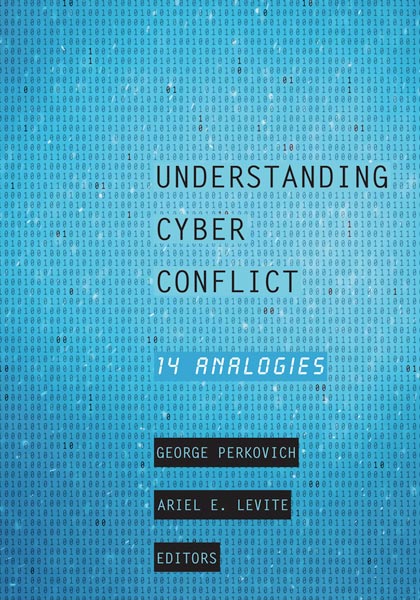 Understanding Cyber Conflict Understanding Cyber Conflict
14 Analogies
Edited by George Perkovitch and Ariel E. LeviteNarrated by Robert Parson
Available from Audible
Book published by Georgetown University Press
Cyber weapons and the possibility of cyber conflict—including interference in foreign political campaigns, industrial sabotage, attacks on infrastructure, and combined military campaigns—require policymakers, scholars, and citizens to rethink twenty-first-century warfare. Yet because cyber capabilities are so new and continually developing, there is little agreement about how they will be deployed, how effective they can be, and how they can be managed.
Written by leading scholars, the fourteen case studies in this volume will help policymakers, scholars, and students make sense of contemporary cyber conflict through historical analogies to past military-technological problems. The chapters are divided into three groups. The first—What Are Cyber Weapons Like?—examines the characteristics of cyber capabilities and how their use for intelligence gathering, signaling, and precision striking compares with earlier technologies for such missions. The second section—What Might Cyber Wars Be Like?—explores how lessons from several wars since the early nineteenth century, including the World Wars, could apply—or not—to cyber conflict in the twenty-first century. The final section—What Is Preventing and/or Managing Cyber Conflict Like?—offers lessons from past cases of managing threatening actors and technologies. George Perkovich is Vice President for Studies at the Carnegie Endowment for International Peace and author of several books including the award-winning India's Nuclear Bomb.
George Perkovitch
is Vice President for Studies at the Carnegie Endowment for International Peace and author of several books including the award-winning India's Nuclear Bomb.
Ariel E. Levite
is a nonresident senior associate in the Nuclear Policy Program and the Cyber Policy Initiative at the Carnegie Endowment for International Peace.
REVIEWS:
“A first-rate cast of contributors.”
—Foreign Affairs “We need to learn from the past, but the danger with historical analogies is that we will too quickly fix on a single one, biasing and narrowing our vision. By giving us a wide range of them, these fascinating essays both teach a lot of history and greatly enrich our understanding of the complexities of cyber conflict.”
—Robert Jervis, author of How Statesmen Think “Perkovich and Levite have brought together the greatest minds on cyber and national security, and in the process they have produced the most comprehensive work to date on the threats posed by cyber and how we should think about mitigating them. The book is must reading for scholars, students, analysts, and policymakers involved in this complex and rapidly growing and changing threat.”
—Michael Morrell, former acting director and deputy director, Central Intelligence Agency “The editors of this very useful work are spot on in their judgment that we have not yet gotten the big ideas of the cyber domain right. We are struggling to see what of our experience in physical space actually transfers to this new domain. Perkovich and Levite have assembled an impressive list of contributors to move that dialogue forward. That makes Understanding Cyber Conflict a must read for anyone who wants to master the complexities of this new space.”
—Michael Hayden, former director, Central Intelligence Agency and National Security Agency “Everyone is looking for the right analogy to understand cyber conflict. This volume of expert essays considers them all, and thus fosters comparative analogical thinking that provides real insight into the challenge of cyber conflict.”
—Jack Goldsmith, Henry L. Shattuck Professor of Law, Harvard University “Analogies can be insightful but also dangerously misleading. Perkovich and Levite have done the policymaker and media commentator a big favour by assembling expert opinion on when it is safe to deploy cyber analogies and when not. Their opening chapter should be compulsory reading for any commentator tempted to apply to today's cyber threats and cyber strategies the apparent lessons of 9/11, Pearl Harbor, Vietnam, Cold War deterrence or Munich appeasement.”
—Professor Sir David Omand, War Studies Department, King's College London, former Director of Government Communications Headquarters (GCHQ)
|

